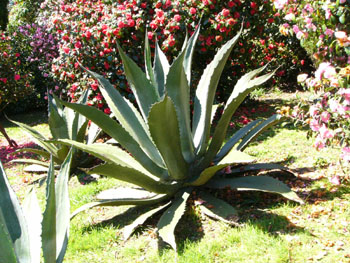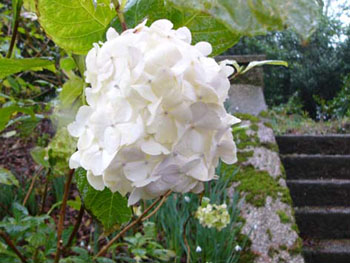Global Warming, part 2
Tracy Wilson looks at the future for gardeners
15th November 2006
 On the way in? Agave
On the way in? Agave
This week, after mixing with the high and mighty at the House of Commons at the All-Party Parliamentary Gardeners and Horticultural Group reception, I found myself actually talking to the Minister responsible for management of climate change. It was interesting to see a broader picture than you sometimes have when you�ve got your nose to the grindstone in your own little patch of the world; to actually realise the wider issues that are involved. We're all going to have to take responsibility for ensuring that we�ve got enough water for our own garden. That�s forgetting the hosepipe bans and the absolutely crass legislation as it stands, whereby you can fill your swimming pool but you can�t actually water your vegetable garden with a hose! It was pleasing to see the commitment that the Minister was prepared to make to say that this would be changed. Something I hadn�t realised is that it is primary legislation, apparently very archaic legislation: this has to be changed for the law to be repealed. So it�s a long-winded process but they are getting there. More interestingly, we were talking about the issues of �Green Miles�. We�ve all heard about Food Miles affecting how we buy food for our own consumption. Do people do actually take time to assess the implications of where their food comes from, in terms of the diesel that has been used? It puts carbon into the atmosphere in order to bring something halfway round the world so that you can eat strawberries out of season. Isn't it in fact better for you to eat foods when they are in season and which have been grown in this country? in my point of view, if nothing else, it gives you something to look forward to! Strawberries become rather bland when you can have them twelve months of the year.
We also talked about composting and the production of your own compost in the garden and the use of peat-free compost in commercial horticulture, which is something we do at the nursery. It�s not something that suits everybody becuase it doesn�t suit every purpose. We have been doing it partly at our Boss�s behest but also because it�s something that we believe is beholden upon us to investigate even if it�s not the easiest of routes to take. So there was much discussion about the use of UK waste, again it�s the same sustainable sources of waste and what you can do in your own garden. All of these seem very big topics, and you might think �Well, how does this affect me?� It affects you directly because it�s going to affect how and what you can use in the garden – the materials which are now accessible to you to use in your garden. We don�t all have access to a compost heap, we�re not all very good at growing compost. So if we don�t, what�s the alternative for us? The good news is that nowadays, if you live with a very small garden where you don�t feel that you can give the space over to a compost heap, you can go out and buy composted green waste: it�s exactly the same as what you would be making in your own compost heap, if you had it dead right. It�s brilliant stuff because it�s been heat-treated so that the weed seeds are all dead, heated to a higher temperature than you can usually reach with your own compost bin. It�s ideal for mixing in with anything that you�re planting in your garden because it�s putting organic matter back in the soil. That�s largely what it�s all about! We�ve got very complacent about how to use one's garden and what one can actually do in it. We�re all very tempted to take the easy way out, whereby we go and buy a box of fertiliser and throw that on the garden, rather than go to the effort of actually making our own compost. Again, when we start to look at these things and we think �OK, I�m going down to the garden centre to buy compost, that�s when you have to start weighing things up a little bit: 'OK, I�m going to drive down to the garden centre and pick this up � I�m going to be burning fossil fuel to do that. Should I in fact be making the effort to make my own compost? I�m encouraging worms into the garden, I�ve got a source for my own organic waste from the kitchen and I've got somewhere to put it.' Then you�re encouraging that most basic cycle in the garden. If you go back a hundred years, it�s what everybody did � people didn�t waste anything, whether it was pig bones or potato peelings � everything had a use somewhere in the cycle of family life. Organic matter all went into the compost bin. We don�t do it now, and mostly it�s pure, bone idleness � we can�t be bothered. Not everybody has room to do it � if you live in a flat with a window box, then it�s not exactly practical! But there are Council schemes whereby you can get your green waste collected and you can even go and pick up a bag of compost later in the year, which has always struck me as a pretty good deal because most people have to pay to have green waste taken away if they�ve got a lot, which isn�t an ideal situation. So anything of that nature is going to help.
When it comes to looking at the climate change and what�s likely to happen, there are two very distinct schools of thought. One is that the country is going to warm up, and the second one being that the Gulf Stream is going to shift and we�re going to be plunged into another Ice Age in the UK. The chances are, that one will follow the other and that we will first of all have the heating up process, then if the Gulf Stream shifts we are then going to hit very cold temperatures. Now unfortunately it�s impossible for us to garden for both situations at once. What you have to do is to adapt first to one situation and then � if the other comes to pass � we�re going to have to learn pretty damn quickly to adapt to the other one. The chances are that, if we do enter the 'Gulf Stream moving' scenario, I�m not going to say it�s not going to matter� but it�s going to be taken out of our hands very very quickly, whereas the heating-up scenario we were talking about with an increase of four to five degrees Centigrade over the next 40-50 years doesn�t sound like a lot but it will make a huge difference to us and how we�re going to garden. We�re going to be looking at using Succulents to create the sort of garden that you see if you go over to Tresco to really enjoy and to get really excited about � but which will become everyday. Over here we�re all going to start to see it and you�re really going to have to think about water conservation, which is why making your own compost, and mulching and all those issues are going to become very important.
Sustainable materials are another issue. I was talking to somebody today who is looking at putting in a woodchip burner for a heating system for a very big, old house. He was saying�Well I�m going to have all these tops from this wood left over, what can I do with them? It�s seems a shame to waste them?� So we�re now looking at the idea of putting that through a chipper or a shredder to provide a mulch material for use as an additional mulch in the garden as a side product of what would be an environmentally sustainable and hopefully more �friendly� heating system for an old house with its stable block and all the outbuildings that go with it. So there are an awful lot of options when you get something like this, but there�s an add-on and � luckily � very often it�s an add-on that benefits the gardeners. It doesn't matter whether you�re using shredded car tyres, or gravel, or lawn clippings or something that�s been chipped up from wood waste. We are going to have to look at mulching in the garden, retaining moisture, protecting plants from late frosts because they�re going to start getting into growth earlier (I know it sounds ironic).
 On the way out? Hydrangea
On the way out? Hydrangea
With the way the temperature is expected to change, spring won�t change that much but the rest of the year will. So we�re going to get more frost damage. We�re also going to get growth much later in the year. We�ve noticed it with Cupressus macrocarpa lutea, which is one of the best conifers for coastal planting, an excellent hedging conifer. Normally they make three to three and a half foot from the liners that we have at the end of the season: this season they�re well over four foot tall and still growing because it�s been so mild, they just haven�t slowed down at all. A lot of other plants are going to be doing the same – it�s always a problem in coastal areas � we don�t get proper seasons. So the wood doesn�t ripen and then we get cold weather in the winter and it gets clobbered, dies back and that�s when you get disease coming into your plant. I think this is going to become an increasing problem which we�re going to see more and more as the winters get milder. If we don�t get a proper �chill�, a proper cold snap, so that�s going to be a problem which gardeners are really going to have to think about very seriously.
Tracy Wilson, 2006
